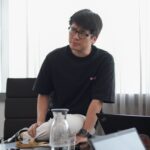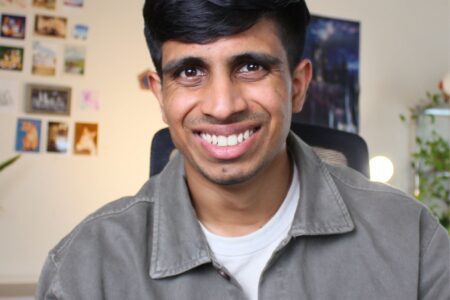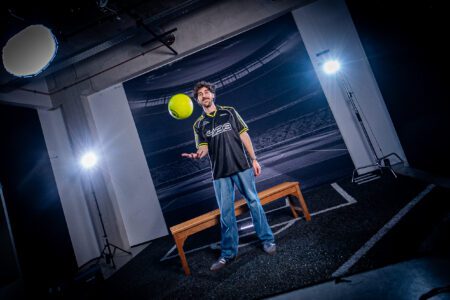
Like all programmes, studying medicine is incredibly demanding. Many students sacrifice sleep, skip meals, and neglect extracurricular activities to keep up with the rigorous syllabus. The pressure to stay ahead often leads to burnout, making time management and self-care essential for surviving this challenging journey.
Adam Ho, a first-year Bachelor of Medicine student at University College London (UCL), which ranks #9 in QS World University Rankings 2025, knows this all too well. He faced the overwhelming challenges of medical school head-on, to the point where “studying medicine almost broke me.”
This experience led to the creation of MediZen, a productivity tool Ho developed to streamline both his academic and personal life. Powered by Notion, it functions as a “third brain” system, saving him nine hours weekly by automating deadlines. With MediZen, Ho could organise his studies, personal projects, and everyday tasks all in one place.
By integrating this tool into his routine, Ho found a way to thrive in medical school without experiencing burnout. “It’s a shortcut to help you study smarter and manage priorities, freeing up time for life outside of studies,” he says.

Born 15 weeks premature, Ho was told he might never walk, talk, or think like his peers. Refusing to be defined by his start, he relentlessly experimented until he cracked the code to systematising success. Source: Adam Ho
Early struggles and a growing passion for medicine
Originally from Hong Kong, Ho spent his early years navigating the city’s fast-paced environment while grappling with a difficult start to life. Born prematurely at 28 weeks, he spent his first weeks in an incubator, fighting to survive. His early development was delayed, leaving him behind his peers in speech, mobility, and learning.
As a child, Ho often felt isolated. While his classmates walked and talked, he was confined to a cart and struggled to keep up. “All this made me seek approval, friendships, and build more relationships with others,” he says.
Instead of chasing a dramatic transformation, Ho embraced consistency. “It wasn’t something transformational,” he says. “It was just about putting in the work every day. Things started to get better when I got into secondary school.”
That’s also when he began seriously thinking about his future. While he was initially drawn to business—“I thought business equalled money,” he says—and later to law because it “sounded cool,” it was a personal loss that shifted his path.
Seven years ago, Ho’s grandfather passed away from an ischemic stroke. “His passing made me think about what I could have done differently in that situation and what I could do in the future to help others in similar circumstances,” he says.
Though the experience didn’t immediately push him into medicine, it planted a seed. He began entering medical competitions and discovered a growing interest in the field.

Ho sees medicine as a gateway to diverse opportunities — entrepreneurship, health tech, marketing, and content creation — that allow him to make a meaningful impact. Its intersection with other fields is what makes the journey deeply fulfilling for him. Source: Adam Ho
MediZen: Your shortcut to a smarter life
For Ho, the idea behind the productivity tool, MediZen, came from a deep belief in balance. He has always preferred to work at his own pace rather than buy into the hustle culture. Some might mistake it for laziness, but for him, “I prefer to call it conserving energy and balancing life and work.”
Originally, MediZen was meant for medical students like himself. But once he opened a waitlist, he realised that the need for balance and better organisation stretched beyond just medics. That’s when he decided to expand the idea and position MediZen as a treatment plan for burnout, disorganisation, and self-sabotage — issues he saw not just in himself but in friends and peers too.
At its core, MediZen was built with a simple philosophy: life, health, and relationships must come first, because without them, even the best work feels empty. Ho’s vision was to create something that would help people finish tasks efficiently, keep their lives organised, and stay connected to what matters. MediZen encourages users to focus not just on their study or career goals, but on maintaining strong health and relationships alongside them. It’s this broader focus that makes MediZen different from traditional productivity tools.
And beyond the personal philosophy, there was also an entrepreneurial side to the project.
“I’ve always wanted to create a digital product that helps people, which ties into my entrepreneurial drive,” he says.

MediZen is a third brain for organising tasks, classes, habits, budgets, and goals, helping students excel academically without burning out. Source: Adam Ho
When branding MediZen, Ho decided not to follow the “second brain” concept popular in productivity circles. The second brain is a digital space to store thoughts, tasks, and notes — essentially a backup for your mind. But Ho felt that the second brain was just that: a tool, not something with a deeper purpose. So he introduced the idea of the “third brain”, a system built on the second brain but with an added mission: to help people create a life where work and personal well-being are truly balanced.
The idea of being the first to coin and define “third brain” was also a smart move for marketing, helping MediZen stand out. “If you search ‘third brain’ on Google, my name and MediZen pop up,” he says. “So from a marketing standpoint, that’s another advantage.”
Curious to know how MediZen helps? Ho explains it through the challenge of revision.
“Simply speaking, many students face the challenge of managing revision schedules,” he says.
“The issue is that the level at which you master each lecture and concept can vary. You might master one concept better than another, and that’s completely normal. MediZen sorts your lectures by how well you’ve mastered them. Some may not have been started yet, some might have only been reviewed once, and others may be completely mastered. Based on how well you’ve mastered each lecture, the system organises them in MediZen.”
So, instead of wasting time figuring out what to study next, students can focus straight on the weaker areas. The system organises their workload in a way that naturally pushes them toward mastery, saving hours otherwise spent planning and allowing more time for actual learning.

Today, Ho ranks consistently in the top 1% at a leading medical school. Source: Adam Ho
The early response to MediZen has been overwhelmingly positive.
“MediZen has been helpful for keeping everything in one place since coming back to university this term. Unlike a paper planner, I can write down all of my upcoming tasks rather than just the ones I want to complete today, and see how long I have to complete them and how important they are. Tasks are seamlessly integrated with a gamification system, allowing you to assign XP to both tasks and rewards as a motivator. I also particularly like the habit tracker and analytics. Thank you, Adam! “
Demi Meakin, 1st Year medical student at the University of Oxford
Med school is such a busy place, and all of us busy people require something to declutter, don’t we? MediZen is probably the only way that has worked for me. For me, the spotlight was gamification, and increasing XP are a boost to work harder! Amazing job, Ho!
Macharla Lekhana, Fourth-Year medical student
Since the beta phase began, interest has only grown. Ho initially set up a waitlist to test the waters before building the full product, and the numbers have skyrocketed — from 0 to 476 interested students. Encouraged by the numbers and the feedback from his early users, Ho feels more confident than ever that MediZen is filling a real gap.

Looking ahead, Ho is leaning toward a specialisation in neuroscience because he genuinely enjoys understanding how the brain works. Source: Adam Ho
Doing less, achieving more
Ho believes true productivity isn’t about working harder or longer; it’s about focusing on doing less with more intensity.
“That’s why I prefer working in 1.5-hour sprints, twice daily,” he says. “It’s about doing less, but technically, you’re not doing less. If you multiply your effort by time, it’s similar to a longer work period but with more focus. For me, doing less gives me more time to do other things — like hanging out with friends, eating, writing LinkedIn content, replying to DMs, sending emails, and responding to the many emails I get asking for tips or help.”
By focusing on less, he gains more clarity and control over his time. He has learned this lesson from past experiences, where revising for eight to nine hours a day led to burnout. “I realised this wasn’t a sustainable approach,” he says. “To be good at something, I must conserve my energy to sustain long work periods.”
Looking ahead, Ho envisions a future where his medical career and entrepreneurial ambitions intersect.
“I may not be working on MediZen forever, and that’s totally okay,” he says.
“I see so many opportunities within medicine, like entrepreneurship, marketing, working with health tech, etc., that allow me to impact people in many different small ways. I can even create content online as a medical student. There are so many other ways medicine is interconnected with other fields, too, and that gives me insane fulfilment in pursuing medicine.”










